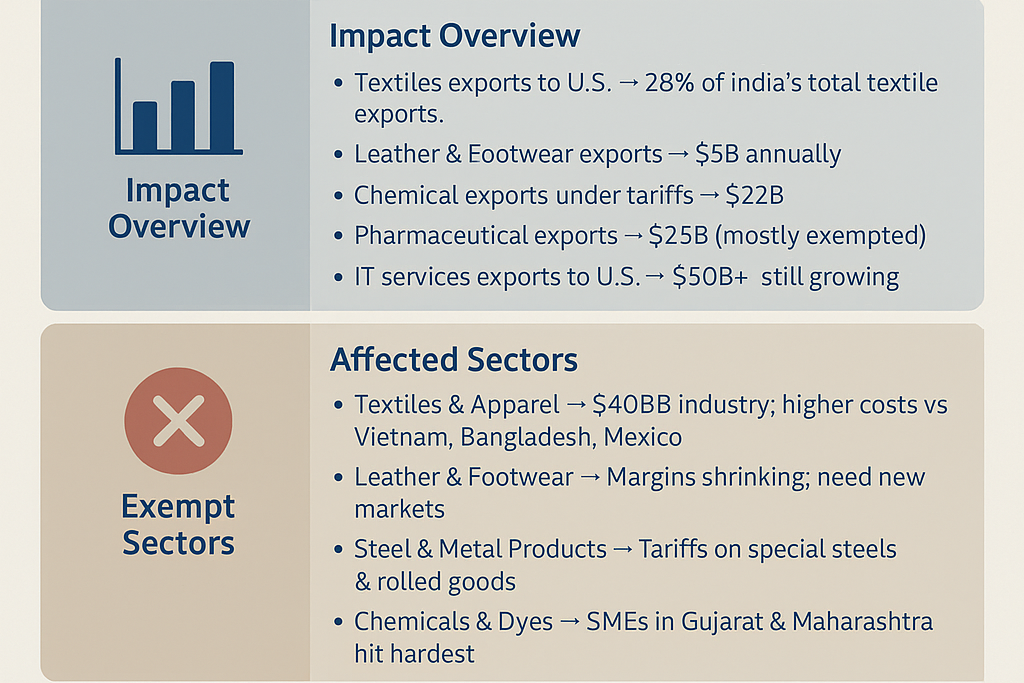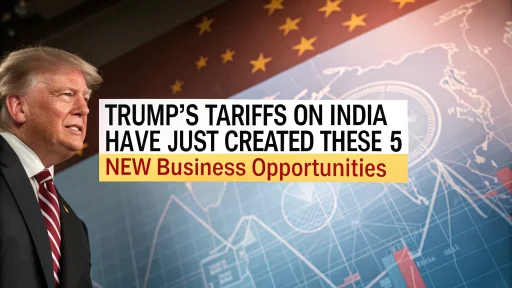The Trump administration’s announcement of new tariffs for Indian exports to the United States has sent waves through the global trading community. These tariffs present both opportunities and challenges for India, which has one of the fastest-growing export industries. Startups, MSMEs, and entrepreneurs that rely heavily on Trump’s Tariffs on India are preparing for the impact. As history has shown, however, trade disruptions can often lead to innovation, import substitution, and diversification of markets.
This article examines the sectors that will be affected, the exemptions, and most importantly, how Indian entrepreneurs can adapt to, survive and thrive in a new global trade order.

Understand the Indian Tariffs
Tariffs are imposed on a large range of Indian exports. They target industries that require a lot of labor, in particular. The most affected sectors are apparel, leather products, certain steel goods, and certain categories of chemicals. Trump’s administration has presented the tariffs to Indian exporters as a way to protect American jobs. However, for Indian exporters, the immediate impact is a reduction in price competitiveness on their largest export market.
The exemptions are for essential raw materials, IT services, and pharmaceuticals, where U.S. industries depend heavily on India.
Related: US Tariffs on India: A Startup’s Assessment of Risks and Opportunities
The Sectors That Are Most Affected by Tariffs
Textiles and Apparel
India exports significant amounts of textiles to the U.S., contributing to the apparel industry’s $40 billion export industry. Tariffs increase the cost of these goods, making them less competitive against Vietnam, Bangladesh and Mexico.
Leather and Footwear
Indian leather products, especially footwear and accessories, are major exports. Domestic manufacturers will see their margins shrink if they don’t change production strategies or find alternative markets.
Steel & Metal Product
The Indian steel industry’s value-added steel sector has been affected by tariffs on special steel products and rolled metal goods.
Chemicals & Dyes
Small and medium manufacturers of organic and specialty chemical products in Gujarat and Maharashtra are affected by tariffs on certain categories.
What Is Exempt from Tariffs?
Some sectors are not affected by the new tariffs despite their broad scope. India continues to receive preferential treatment in the pharmaceutical industry, as it is the world’s largest generic drug supplier to the U.S. India’s IT services and software, which are a cornerstone to its economy, remain exempt. This ensures continued growth. The United States has also been exempted from the tax on raw materials that are critical to its industry. This includes rare earth derivatives, certain agrochemicals and other agrochemicals.
Related: Import US Tariffs & Strategies for Indian Exporters
Startups Can Benefit from Tariffs
While established exporters are scrambling to minimize losses, startups may view this disruption in a positive light. The following are key opportunities:
- Import Substitution: Products such as specialty chemicals and intermediates can be manufactured in the country, reducing the reliance on imported goods.
- Entrepreneurs should consider expanding their export markets to Europe, Africa and Southeast Asia, where the demand is increasing.
- Diversification: shifting focus from apparel and textiles to technical textiles or eco-friendly alternatives such as vegan leather.
- Digital-First trade: Leveraging B2B and e-commerce marketplaces to bypass the traditional trade barriers to reach global customers directly.
How NPCS Supports Entrepreneurs
Niir Project Consultancy Services provides professional consulting services for the preparation and submission of detailed techno-economic feasibility reports (DPRs). Our reports include:
- Manufacturing process in detail
- Market Research and Demand Analysis
- Process flow diagrams
- Product Mix and Capacity Planning
- Raw material and machinery details
- Complete project financials, including profitability analysis
We aim to assist entrepreneurs in evaluating industrial projects for feasibility, profitability and scalability.
The Tariffs Are Creating Sector-Specific Business Opportunities
Specialty Chemicals
Due to the U.S. tariffs on specialty chemicals imported from India, entrepreneurs in India can now focus their efforts on meeting local demand and exploring new international markets. Startups can build small-scale facilities for intermediates that are used in paints and coatings, pharmaceutics, or other industries. The projected CAGR for the sector of 9-10% will ensure long-term growth.
Textiles for Technical Use
While traditional apparel exports are suffering, technical textiles like non-wovens and geotextiles as well as medical textiles, have a high growth potential. India’s infrastructure boom and the healthcare demand present immediate opportunities.
Green Leather Alternatives
The tariffs on leather exports are paving the way for eco-friendly alternatives such as vegan leather and textiles made from plant-based materials. Startups can use sustainability trends to develop products for domestic and international markets.
Agrochemicals & Food Processing
Agrochemicals remain a growing area, with export opportunities. Startups can tap into the global demand for packaged and ready-to-eat foods by developing value-added processing businesses.
Digital & Ecommerce
Digital platforms enable Indian startups to reduce their dependence on a specific geography, such as the U.S. Entrepreneurs can build global brands using platforms like Amazon Global, Alibaba and direct-to-consumer models.
View our Books for more additional knowledge
Overview of the Impact
- India’s textile exports to the U.S. are nearly 28%.
- Leather and footwear exports are worth over $5 billion annually.
- Tariffs are imposed on certain chemical exports worth $22 billion.
- The pharmaceutical industry continues to thrive, with exports worth $25 billion and most of them exempted from tariffs.
- The export of IT services to the U.S. is now over $50 billion per year, and continues to grow in spite of tariff challenges.
For more information, check out our related videos
Success Stories for Entrepreneurs
Inspiration from India’s leaders in business can be a source of guidance during times of disruption.
- Mukesh Amanani (Reliance Industries) has successfully diversified from petrochemicals into telecom and digital services. This is a great example of the importance of agility.
- Ratan Tata (Tata Group): Concentrated on global acquisitions for diversification of risks and resilience.
- Uday Kotak, Kotak Mahindra Bank: Created a financial empire after identifying the gaps in India’s Banking Sector.
- Kiran Mazumdar Shaw (Biocon): Transformed India as a global hub for biotech with a focus on affordability, innovation and quality.
These examples show how diversification and strategic investments can help businesses thrive despite challenges.
Discover the Right Business for You With Our Startup Selector Tool
Conclusion
India’s entrepreneurs are facing a crucial moment with the Trump administration’s imposition of new tariffs on Indian imports. Some sectors will suffer immediate losses, but others offer untapped growth opportunities. Startups can thrive by focusing on innovative business models and new export markets. Entrepreneurs can turn trade disruptions into profitable business ventures with the help of NPCS’s professional guidance and the inspiration of India’s leading business leaders. Innovation, adaptation, and resilience are the keys to success.







